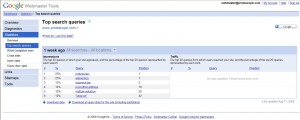Most of the major search engines have some kind of “Webmaster tools.” The three we use so far are:

Number 42 for "strap on"…oh dear.
In a not-surprising turn of events, Google’s is by far the most useful. Although its utility diminishes somewhat when it is “punishing” you. Both Microsoft’s and Yahoo!’s have fewer features and Yahoo!’s even has a 24 hour “pending” period when you join. I have no idea why they can’t just validate you immediately like everyone else; that’s part of the purpose of me putting an otherwise useless file on my server.
Anyway, if you’re not using these I recommend them. They can help you analyze what’s going on with your website, which can be a difficult thing to determine at times. For example, with Google’s tools, you can:
- Check when your site was spidered last
- See what errors the bot encountered on your site
- Find “problem content’ like duplicate titles”
- See what searches you rank best for (VERY useful)
- Determine the most frequent keywords in your site and links to your site
…and of course more. These features can really help identify problems on your site and even, in some cases, strengths. I would definitely put these tools on my “must have” list. Also check out the relevant blogs for the tools:
Categories: Applied Use · Main blog narrative · Reviews

When all you have is a hammer, every problem looks like a nail. Or something like that…
We’ve been hunting for bad neighborhoods. In fact we’ve been hunting desperately for them. As I’ve mentioned before, we’ve clearly been “punished” by Google and we’re trying to find the cause. At about the time of our last spider, our inbound Google traffic basically dropped to nothing and the only thing we could come up with was that we were linking to a “bad neighborhood.”
Walt Disney World for Grownups links to quite a few sites. We have painstakingly culled a terrifying amount of Disney World information down to the “Best of the best.” We fear however that somewhere in the process we’ve linked to a bad neighborhood. So in a completely twisted maneuver we’re modifying our content, in the pursuit of Pagerank.
Our status with MSN, Live and Yahoo seems to be improving consistently, but Google is now all but invisible, and we’re fairly desperate to fix this problem. Unfortunately, trying to figure out which of our many outbound links (we are a link directory after all) is the troublemaker is time-consuming to say the least. Do we ditch content we think is worthwhile in the pursuit of pagerank, or do we take a stand against the entity that is Google and keep our content?
Enter “nofollow”
Google’s Information on rel=”nofollow” is roughly in line with what I’ve been led to believe by the rest of the ‘net. The implication is that by adding this attribute to my links I am no longer responsible for the content at the destination. So our obvious solution is to take most of our outbound links and make them nofollow.
Of course one wonders: If Google is so concerned with identifying pages that link to “bad neighborhoods”, why would they allow us to wash our hands of all our links? If they’re trying to identify and penalize spam sites, are they really ignoring these links? What’s their incentive to do so in this matter? Obviously there is an incentive to allow sites like Wikipedia not to confer their Pagerank to contributors (more on this in another blog), but why would they really want to prevent themselves access to information that is useful to them and at their disposal.
Google seems to be pretty explicit on the matter:
Untrusted content: If you can’t or don’t want to vouch for the content of pages you link to from your site — for example, untrusted user comments or guestbook entries — you should nofollow those links. This can discourage spammers from targeting your site, and will help keep your site from inadvertently passing PageRank to bad neighborhoods on the web. In particular, comment spammers may decide not to target a specific content management system or blog service if they can see that untrusted links in that service are nofollowed. If you want to recognize and reward trustworthy contributors, you could decide to automatically or manually remove the nofollow attribute on links posted by members or users who have consistently made high-quality contributions over time.
However I can’t bring myself to believe they would deny themselves a tool for identifying spam. As such, for the time being we are removing the links we fear might have contributed to our penalty and nofollow-ing most of the rest. Hopefully we can add them back later, but we’d rather get some traffic to an inferior product than none to a superior one.
Categories: Main blog narrative
One troubling question I’m repeatedly facing is: How important is it to allow people access to your real life?

Have you read my blog?!?!
If you look at the successful bloggers, you will find that almost all of them do things to promote themselves as a brand attached to their blog. They appear in interviews, they do podcasts and video clips, and so on. They basically are willing to use “Internet fame” to help promote their product.
Now obviously this is a valid and good tactic; the question however is whether it’s necessary. Can you have a successful site without putting up pictures and videos and letting people into your personal life?
My first observation is that it is an obvious mechanism to build trust. The more I let you know that I am a “real person,” the less you fear that you’re being manipulated by a spammer or a Viagra salesperson or a cold-hearted corporation. Much of the same impulse that drives the stigma of monetization makes people leery of anonymity. In fact, anonymity is one of the best and worst parts of the Internet. While we all like that we can look up information on our reason for incontinence without everyone knowing about it, we don’t necessarily all enjoy people who use the anonymity to spam us or spout racist nonsense and such. Thus the more “signals” you can put on your site that you are “real,” and to some degree “not malevolent,” the better.
My second observation is that I’m not entirely sure why I’m so opposed to things like putting my image or voice on the Internet. I’m an introvert and greatly enjoy my privacy. I’m one of those people who would not only rather be rich than famous, I’d rather not be famous. All that being said one wonders why I’m so convinced that I am going to suddenly become dazzlingly famous if I put a picture of myself on my websites.
When I have worked out with girlfriends in the past I have always tried to get them to do fewer reps with heavier weights. To forestall a weightlifting debate let’s just say that I believe there are some benefits to doing that at least some of the time. Anyway, whenever I would suggest that practice, they would always tell me they didn’t want to “get bulky.” I always thought that was a ludicrous worry. Did they really think that by lifting a heavier weight twice a week they would develop the kind of muscle mass that people strain for lifetimes to develop? Perhaps this is similar to my fear of “Internet fame.” One picture does not a Paris Hilton make.
Ultimately, I would have to say that at the very least it is going to be a serious impediment to be overly concerned about your privacy when trying to develop an online product. The same things that make me leery about having my “personal information” out in the ether are the same things that make people leery of trusting a site without—at a minimum—the ability to put a face to the name/pseudonym/website/whatever.
Categories: Main blog narrative




